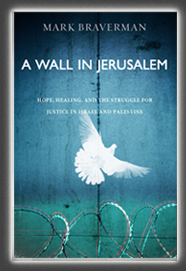
Washington Report on Middle East Affairs – Review by Hassan Fouda
Fatal Embrace: Christians, Jews, and the Search for Peace In the Holy Land
By Mark Braverman, Synergy Books, 2010, paperback, 416 pp. List: $16.95; AET: $14.
Reviewed by Hassan Fouda
THIS IS A BRILLIANT, thought-provoking and sorely needed book on the religious dimensions of Israel-Palestine. Braverman’s critique of other books on the topic is sharp, perceptive and captivating. He laments the current state of interfaith dialogue in the West as often constrained and manipulated, and provides a principled framework for fruitful interaction. The book explains, with moral clarity, how contem-porary Christian theologians, in their admirable zeal to atone for the crime of the Holocaust and to foster inter-religious reconciliation, have aided and abetted the oppression of the Palestinians and at the same time have betrayed the foundations of their own religion. This is an urgent issue for all Christians to address in their churches, seminaries, and everyday relationships and activities. In his call for the church to take on the prophetic task of pursuing justice in the Holy Land, Braverman urges a return to the original values of social justice and nonviolent resistance to oppression that accompanied the birth of Christianity. In Braverman’s own words: Let Jesus be Jesus.
The book exposes the many progressive Jewish intellectuals who readily admit the dark side of Israel and political Zionism but continue to be blinded by their own Jewish exceptionalism from reaching the appropriate moral conclusions. Braverman courageously calls on Jews to relinquish the “tribal” exclusivist aspects of Judaism, to move beyond nurturing their identity of “specialness,” and to emphasize the social justice lessons of their ancient prophets. The author is seeking nothing less than radical reformation, a shared and universal new covenant. In one example, he cites the Jews’ abandonment of the ritual of animal sacrifice, arguing that religious renewal is also a Jewish tradition.
Braverman’s love of the scriptures and for the Jewish people shines through every page of his book. His own transformation from a conservative religious Zionist to an advocate for universal human rights is inspiring. Limiting the discussion to the 1967 occupation, he argues, as advocated by many progressives, is lacking and misguided. He predicts that partial justice measures aimed at maintaining an exclusive Jewish state and salvaging a “humanistic Zionism” will not work. Mindful that support for Zionism is rooted in the very problematic aspects of Judaism that he seeks to consign to history, he warns that the survival of the Jewish people is at stake. Braverman pleads especially with Western Christians to cease giving Israel “a free pass” even at the cost of alienating establishment Jews. The only moral imperative, he maintains, is ending Jewish privilege and the re-establishment of justice and complete equality for all the people in the Holy Land.
This reviewer is reminded of the many astute observers who reached similar conclusions. In his 1970 book The Evasive Peace, the late Prof. John Davis (commissioner general of the United Nations Relief and Works Agency) analyzed the situation in Palestine/ Israel at the time and explained that durable peace can only be achieved by “de-Zionization.” Had the international community heeded Dr. Davis’s call at the time, the loss of thousands of human lives, and much of the suffering and destruction of the last few decades, would have been avoided. One can only hope that the human family will not wait much longer before acting on Mark Braverman’s soul-searching diagnosis and recommended remedy.
Hassan Fouda, Ph.D. is board director of the Israeli Committee Against House Demolitions (ICAHD)-USA.
__________________________________________________________________________________

